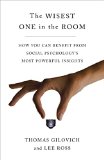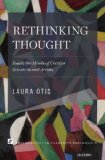new book – ‘The Wisest One in the Room: How You Can Benefit from Social Psychology’s Most Powerful Insights’
December 4, 2015
(NOTE: As an Amazon Associate I earn from qualifying purchases.)
The Wisest One in the Room: How You Can Benefit from Social Psychology’s Most Powerful Insights by Thomas Gilovich and Lee Ross (Free Press, 2015)
Book description from the publisher:
Renowned psychologists describe the most useful insights from social psychology that can help make you “wise”: wise about why people behave the way they do, and wise about how to use that knowledge in understanding and influencing the people in your life.
When faced with a challenge, we often turn to those we trust for words of wisdom. Friends, relatives, and colleagues: someone with the best advice about how to boost sales, the most useful insights into raising children, or the sharpest take on an ongoing conflict. In The Wisest One in the Room, renowned social psychologists Thomas Gilovich and Lee Ross ask: Why? What do these people know? What are the foundations of their wisdom? And, as professors and researchers who specialize in the study of human behavior, they wonder: What general principles of human psychology are they drawing on to reach these conclusions?
They begin by noting that wisdom, unlike intelligence, demands some insight into people—their hopes, fears, passions, and drives. It’s true for the executive running a Fortune 500 company, the candidate seeking public office, the artist trying to create work that will speak to the ages, or the single parent trying to get a child through the tumultuous adolescent years. To be wise, they maintain, one must be psych-wise.
Gilovich and Ross show that to answer any kind of behavioral question, it is essential to understand the details—especially the hidden and subtle details—of the situational forces acting upon us. Understanding these forces is the key to becoming wiser in the way we understand the people and events we encounter, and wiser in the way we deal with the challenges that are sure to come our way—perhaps even the key to becoming “the wisest in the room.”
Google Books preview:







